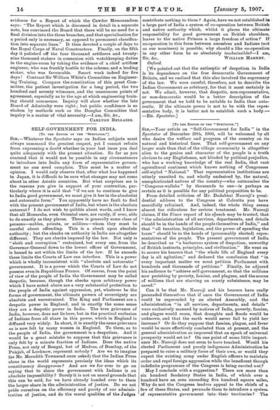SELF-GOVERNMENT FOR INDIA.
To um Dorms or rat .srscrrvoa."] Sia,—Whatever the. Spectator says on Indian subjects must always command the greatest respect, yet I cannot refrain from expressing a doubt whether in your last issue you deal quite adequately with the present situation. So far as you contend that it would not be possible in any circumstances to introduce into India any form of representative govern- ment no one need complain. This must be a matter of opinion. I would only observe that, after what has happened in Japan, it is difficult to be sure what changes may not come about in other Asiatic countries. But what surprises me is the reasons you give in support of your contention, par- ticularly where it is said that "if we are to continue to give to India good government, we must give it her in the absolutist and autocratic form." You apparently have no fault to find with the present government of India, but where is the absolute autocrat ? I do not wish to quibble about words, and I know that all Monarchs, even Oriental ones, are rarely, if ever, able to do exactly as they please. There is generally some class of persons—nobles, priests, or soldiers—whom they must be careful about offending. This is a check upon absolute authority ; but the checks on authority in India are altogether different. They are checks imposed by the law. Not only is "sloth and corruption" restrained, but every one, from the Governor-General down to the lowest officer of Government, is bound to act within.the limits of the law. If he exceeds these limits the Courts of Law can interfere. This is a power which is wholly inconsistent with "absolute and autocratic" government. It is a power which the Courts of Law do not possess even in Republican France. Of course, from the point of view of the people of India the Government may be called despotic, because, though the checks upon arbitrary power which I have noted above are a very substantial protection to the people of India against oppression, yet, whatever be the forms of government, the ultimate powers of sovereignty are absolute and unrestrained. The King and Parliament are a despotic power in England, and in exactly the same sense they are a despotic power in India. The true grievance of India, however, does not lie here, but in the practical exclusion of Indians from all share in this power, which in England is diffused very widely. In short, it is exactly the same grievance as is now felt by many women in England. To them, as to the people of India, the government is a despotism. And it would be a great mistake to suppose that this grievance is only felt by a minute fraction of Indians. Does the native Press, not only of Bengal, but of Madras, of Bombay, of the Puiljab, of Lucknow, represent nobody ? Are we to imagine as Mr. Meredith Townsend once asked) that the Indian Press alone in the world represents precisely the ideas which its constituency disapproves ? And are we for ever to go on saying that to share the government with Indians is an absolute impossibility ? Surely it is not on moral grounds that this can be said, for we have already handed over to them the larger share in the administration of justice. Do we not pride ourselves on the efficiency and purity of our adminis- tration of justice, and do the moral qualities of the Judges contribute nothing to thew? Again, have we not established in a large part of India a system of co-operation between British and native authority which, whilst it places the ultimate responsibility for good government on British shoulders; leaves to the native Princes a large freedom of action ? If - co-operation in this form between ourselves and Indiana (not as our nominees) is possible, why should a like co-operation in any other form be so absolutely inadmissible?—I am, [We pointed out that the antiseptic of despotism in India is its dependence on the free democratic Government of Britain, and we realised that this also involved the supremacy of the law. We were careful, therefore, not to describe the Indian Government as arbitrary, for that it most certainly is not. We admit, however, that despotic, non-representative, or non-democratic would be a better description of the government that we hold to be suitable to India than auto- cratic. If the ultimate power is not to be with the repre- sentative body, it is better not to establish such a body...-. —ED. Spectator.]














































 Previous page
Previous page